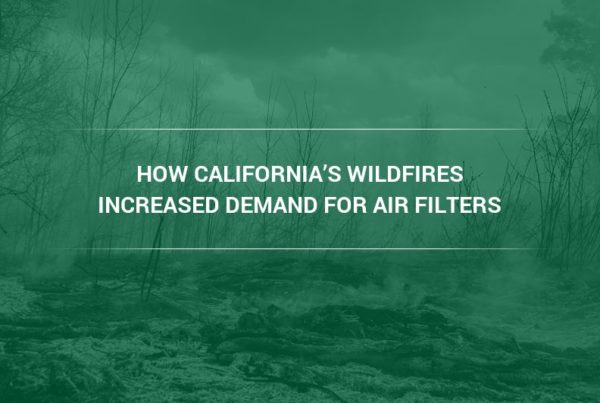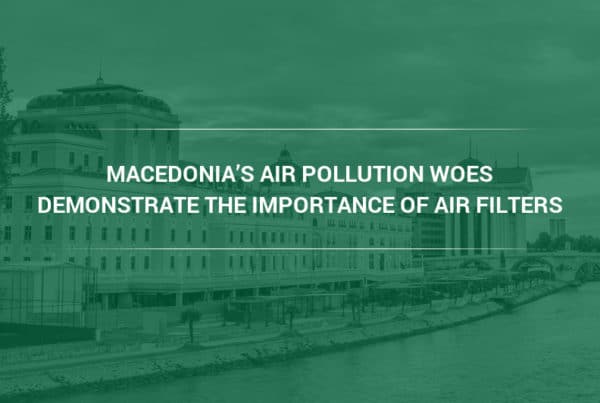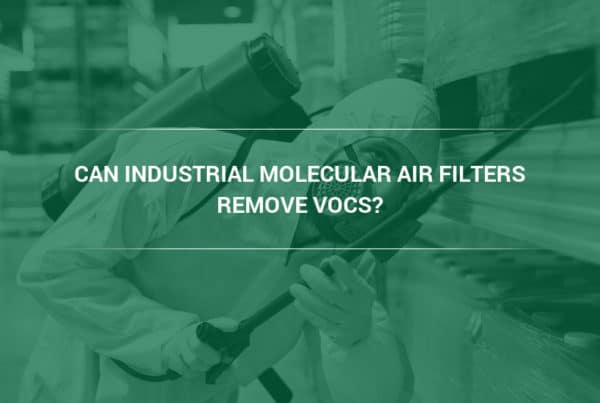Commercial air filters are necessary for protecting your health from different air pollutants. Commercial air filters will remove the harmful air pollutants that come from both indoor sources and those that are found outdoors which may enter a building through windows or air exchange devices. While these filters are integral to your health, they must also be replaced regularly. If a filter is not regularly replaced they will clog from all of the particles of pollution they capture over time. Clogged filters cause a number of different problems, but most crucially they fail to trap the pollution particles that can harm your lungs.
Pollutants Trapped by Industrial Air Filtration Units
Industrial air filtration units can capture a number of different toxic air particles. These particles include both indoor and outdoor air pollutants. Outdoor air pollutants include what the EPA terms “criteria air pollutants” and they refer to the pollutants which are most harmful to human health and most ubiquitous, including particulate matter, sulfur dioxide, nitrogen oxide, and volatile organic compounds. Commercial air filters also trap a variety of indoor air pollutants, such as dust, animal dander, and mold.
Sulfur dioxide and nitrogen oxide come from the combustion of fossil fuels. These compounds are often emitted by industrial facilities and the transportation sector. The burning of gasoline to power cars is a massive contributor to emissions of nitrogen oxide. Nitrogen oxide and sulfur dioxide can also be released by devices which burn fossil fuels in a home, such as a heater or an oven.
Volatile organic compounds refer to compounds which can interact with heat and sunlight to create ground-level or tropospheric ozone. While ozone is a beneficial chemical when it is in the upper atmosphere, as it protects us from the sun’s ultraviolet rays, at ground-level it is a toxic air pollutant which harms people’s health. Volatile organic compounds can come from a variety of sources, including cleaning chemicals, paints, varnish, and other household chemicals.
“Biological pollutants such as animal dander and mold are frequent sources of pollution indoors,” stated Camfil’s Charlie Seyffer, Manager of Marketing & Technical Materials and 37-year ASHRAE member and active committee participant. “Animal dander comes from pets, while mold can grow in any moist areas such as bathrooms or basements. Mold can even grow in ventilation systems themselves if they are exposed to moisture.” (1)
Particulate matter (PM) does not refer to any one source of pollution, but rather refers to a variety of different pollutants that are small enough to enter people’s lungs and bloodstream. Particulate matter is usually grouped into three different categories, PM1, PM2.5 and PM10. These particles are smaller than 1 µm across, smaller than 2.5 µm across, and smaller than 10 µm across respectively. PM pollution can have a wide variety of sources including natural sources and man-made sources. Man-made sources include the combustion of fossil fuels and secondhand smoke.
Industrial Air Filtration and Ventilation Protects People’s Lungs from Damage
Exposure to the variety of pollutants that commercial air filters trap can harm people’s health, damaging their lungs, bloodstream, and even brains. Industrial air filtration and ventilation can prevent people from developing the diseases associated with exposure to common indoor and outdoor air pollutants.
Exposure to nitrogen oxide irritates the lungs and respiratory system in general. It can lead to difficulty breathing, as well as intense coughing and wheezing. Exposure to large amounts of nitrogen oxide can require visits to the emergency room, and prolonged exposure to nitrogen oxide is correlated with respiratory infections and the development of asthma. This is all true of sulfur dioxide as well. Sulfur dioxide and nitrogen dioxide also contribute to the development of acid rain which harms the environment.
“Ground-level ozone can cause difficulty breathing, coughing, and inflammation of the lungs,” says Seyffer. “It can lead to decreased overall lung function, as well as the development or exacerbation of respiratory diseases like emphysema, asthma, and bronchitis. People with pre-existing conditions and those who don’t get enough vitamin E or C in their diet are at special risk for harm when exposed to ozone air pollution.” (2)
Biological pollutants such as animal dander can trigger symptoms of asthma in those with the condition, and exposure to mold can lead to infections within the lungs or other areas of the body. Exposure to mold can be extremely dangerous requiring a trip to the emergency room and treatment with anti-fungal medications.
Exposure to particulate matter is correlated with a number of different health problems including asthma, stroke, heart attacks, the development of diseases such as chronic obstructive pulmonary disorder, and even an increased risk for lung cancer. Exposure to particulate matter can permanently decrease an individual’s lung function as well.
Problems Caused by Clogged Commercial Air Cleaners
Clogged commercial air filters lead to a number of different problems throughout a home or commercial building. One of the problems that clogged commercial air filters cause is increased exposure to harmful air pollutants. Clogged filters cannot remove air pollutants as effectively, meaning more air pollutants exist and can accumulate within the air in a building. This means that people in a building with a clogged filter are exposed to higher levels of air pollutants, endangering their health.
Clogged filters can also cause a number of other issues including problems heating or cooling a building, water damage of drains and vents in an HVAC system, or damage to air compressors or heat pumps.
“Air conditioners and heat pumps can be damaged by clogged filters, as the evaporator coil will begin to freeze due to the fact that less air can flow through the system and across the coil,” says Seyffer. “This is because refrigerant can still be flowing through the evaporator coil, but the lack of airflow means that the cold isn’t being absorbed by the refrigerant or coils. The frost that builds up on the evaporator coil can cause water damage to a home or business, requiring serious repairs be done.” (3)
Clogged filters can also stop a building from heating effectively. Restricted airflow due to a clogged filter means that the heat level within the heat exchanger grows ever higher. There are fail-safes built into heat exchangers that turn off the heat when it exceeds a certain temperature. An HVAC system that may restart and stop continuously until the issue with the clogged filter is fixed, failing to generate the proper amount of heat in the meantime.
Best Maintenance Practices for Commercial Air Filtration Systems
Because of the dangers associated with having a clogged air filter, it is important that maintenance is performed regularly on commercial air filtration systems and that filters are changed regularly. Filters need to be changed based upon the filter manufacturers recommendation. If a building is situated in a heavily polluted area, or there are many sources of indoor air pollutants within a building, then the filter may have to be changed more frequently. Consult with your local air filter supplier or air quality expert for change intervals that will be beneficial in your application.
HVAC systems should be inspected regularly to ensure that any openings or gaps within the system are plugged or sealed with metal foil or duct sealant. This helps save energy costs by ensuring that fluctuations in temperature are minimized.
HVAC systems should also be inspected to ensure there are no gaps between the filters. Gaps between filters can lead to a situation called filter bypass, where air simply bypasses the filter, recycling air through the building while still being full of air pollutants.
What about Industrial HEPA Filters?
Industrial HEPA filters are capable of removing the smallest and most dangerous particles from the air. HEPA filters have a special filter media that can capture 99.97% of all air pollutants. Yet this highly efficient filter media also means that an HVAC system must work harder to push air through the system, translating to increased energy costs. This is especially true if a HEPA filter becomes clogged, as both the density of the filter media itself and the trapped particles will prevent air from moving through the system.
For these reasons, it is important to change filters as recommended and to check to make sure the filters aren’t clogged. This applies to filters used within an HVAC system as well as filters that are part of a standalone air purifier.
Camfil USA can provide you with high-quality commercial air filters less prone to clogging than other filters. They can also advise you on best maintenance practices for filters and HVAC systems, so click here to contact Camfil USA today.
Sources:



